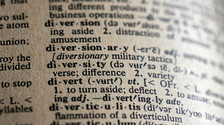Whether it’s fireworks, champagne or a kiss on the lips at midnight, most cultures have a traditional way of celebrating New Year’s Eve. But one thing that is common across the world is using this time of the year to talk about plans, hopes and predictions for the future.
When we do this, we can generally split it into three categories: our definite arrangements, our general intentions and our predictions. In this article we’re going to be looking at some of the most common forms for expressing these ideas and the differences and similarities between them in English.
Firstly, let’s look at the types of conversations people commonly have during the New Year’s Eve period.
In many parts of the world, it is customary to make a pledge for the upcoming year, known as a New Year’s Resolution. This may consist of promising to quit smoking or lose weight. Or it might involve a career goal such as getting a sought-after promotion or starting a business.
In addition to making resolutions to change our lives for the better, New Year’s is also a time to consider the year ahead. It’s common to make predictions about how we think the year will progress. Will our favourite football team find success? Will we find love? Will our dreams become reality this year?
This is also the time of year to consider the plans we have already made. Perhaps we’ve booked a dream holiday in the summer? Or maybe we’re about to start an educational course which could take our lives in a different direction? Whatever the plan, the new year usually brings with it a whole bunch of new opportunities or commitments that we have already agreed to.
So, let’s get started on some useful language.
Plans and intentions
Depending on whether we are talking about what we are planning to do or what we just intend to do, we use two different forms in English. Let’s look at both of those forms, including their similarities and differences.
Form #1: Present continuous
We can use the present continuous tense to talk about definite arrangements in the future. Definite, in this context, means we have agreed to the specific plan beforehand and know, for example, when, where and with whom we are doing this thing. Let’s look at some examples:
- I’m starting university in September.
Here, we would assume, the university application has been accepted and confirmed. We know which university we are going to and which course we are studying. It has an agreed-upon start date and an acknowledged location.
- We’re quitting our jobs and going travelling.
Again, this plan is certain and has an agreed-upon schedule. Perhaps the person speaking knows the date they are doing this or have already booked their flight tickets out of the country.
Form #2: Going to + verb
We can use going to + verb to talk about definite arrangements (just like the present continuous above), but we can also use it to talk about general intentions. A general intention is something that we intend to do but, perhaps, we have made no definite arrangements to do it yet. It could also be something that we wouldn’t usually think of as an “arrangement.” Take a look at these examples:
- I’m going to start eating healthier.
This is a general intention. We have not specified exactly when we are going to do this or for how long. We could start tomorrow or we could start in a month or two’s time.
- He said he’s going to quit smoking this year.
Again, this general intention has not been formally arranged with anyone. It is an aim to do something at an unspecified future time.
However, as we previously noted, going to + verb can also be used for definite arrangements. So the sentences we looked at in the present continuous could also be expressed using this form. For example:
- I’m going to start university in September.
- We’re going to quit our jobs and go travelling.
Times when we cannot use the present continuous
Because the present continuous is only used for definite arrangements, there are times when it is not appropriate. Take a look at these examples:
- I’m becoming a millionaire this year.
Wrong. This is a general intention not a definite arrangement, so we cannot use the present continuous. The correct form would be: I’m going to become a millionaire this year.
- We’re spending more time with our children.
Wrong. Again, this is not something we would consider a definite arrangement. As such, we would probably use going to + verb. For example: We’re going to spend more time with our children.
Talking about the new year
Let’s look at some more general intentions and definite plans for talking about the new year:
- I’m going to lift weights every day before work so I’ll be in shape by the time we go on holiday.
(A general intention)
- She’s going to try that diet again that she was following last year.
(A general intention)
- We’re flying to Greece in March for a cousin’s wedding.
(A definite arrangement)
- She’s starting driving lessons next week so we might buy a car soon.
(A definite arrangement)
Predictions
There are many ways of making predictions in English and here we’re going to look at two of the most common. By the end of this section, you should understand the main differences and also when either form can be used.
Form #1: Going to + verb
We often use going to + verb for making predictions about the future in English. The most important thing to remember with this form is that we are making the prediction based on present evidence. But what does that mean in practice? Take a look at these examples:
- Look at those clouds! It’s going to rain.
In this example, we are making a prediction about the weather. We can imagine that we are looking up to the skies and can see the dark rain clouds overhead.
- We’ve got the test results. He’s going to be fine!
Here we’re making a prediction about someone’s health. We’re basing this prediction on the test results and, therefore, present evidence.
Form #2: Will + verb
We said that going to + verb is used for predictions based on present evidence. How is will + verb different? Well, this time it is a prediction based on pre-existing belief or expectation. Let’s look at some more examples:
- You should take your coat because it’ll probably rain.
We made a prediction about the rain in the going to + verb section above, but it was based on present evidence (the dark clouds). This time we’re basing this prediction on our expectation or pre-existing belief. Perhaps it commonly rains at that time of year or the person is travelling to a place where it rains a lot.
- John’s a fighter. He’ll be fine, don’t worry.
This is another prediction about someone’s health. However, unlike the example we saw using going to + verb above, it is not based on present evidence. Instead, the person speaking is making a prediction based on a pre-existing belief or expectation about John. Perhaps he is a naturally strong or determined person and doesn’t usually let illness affect him.
Talking about the new year
Let’s look at some more predictions about the new year using these two forms:
- I’m going to lose so much weight if I continue exercising every day.
(A prediction based on present evidence)
- Derek’s going to be so hungover if he keeps drinking that champagne!
(A prediction based on present evidence)
- It’ll be a really long summer if the last few are anything to go by.
(A prediction based on pre-existing belief or expectation)
- It’ll be impossible to get a taxi just after midnight so we should probably just walk home.
(A prediction based on pre-existing belief or expectation)
Times when we can use either form
In some circumstances we can use either will + verb or going to + verb to make predictions about the future. We have the option of either form when it is not clear if the prediction is based on pre-existing belief/expectation or present evidence. Look at these examples below:
- Who do you think is going to win the league this season?
- Who do you think will win the league this season?
Image Sources
Hero Image by Chris Phutully (CC BY 2.0)







